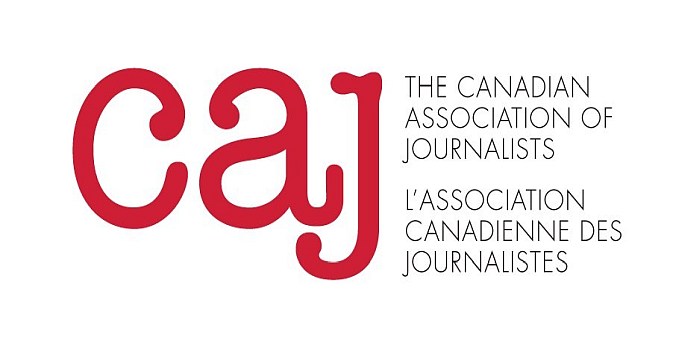TORONTO, Canada – The Canadian Association of Journalists (CAJ) is appalled by the preposterous statements made by the Royal Canadian Mounted Police (RCMP) in a court filing to justify the arrest – and the breach of the Charter rights – of award-winning photojournalist Amber Bracken while documenting the construction of TransCanada’s Coastal GasLink pipeline on unceded Wet’suwet’en territory in late 2021.
Late last week, The Canadian Press reported on the public release of the RCMP’s response to a civil suit filed by Bracken and The Narwhal, for whom Bracken was on assignment at the time of her arrest. The RCMP’s filing argues that Bracken was “aiding or abetting” protesters, which meant she was “not engaged in apparent good faith newsgathering activities” when she was arrested in November 2021 for failing to comply with an injunction order.
“These efforts by the RCMP to cast Bracken as a so-called ‘protester’ are a lazy and wholly indifferent interpretation of the role journalists play in the fabric of Canadian democratic society,” said Brent Jolly, CAJ president.
“The RCMP’s response in this filing is perhaps the most farcical demonstration yet of the RCMP’s efforts to restrict press access and stifle journalistic work. It’s a masterclass in ignoring and denying the constitutional and legal protections afforded to journalists in Canada to do their jobs without interference.”
In their filing, the RCMP assert that Bracken, on assignment as a journalist, was not exempt in law from obeying the terms of the injunction order. They argue, furthermore, that by embedding with pipeline opponents, which is a common practice for independent journalists who are bearing witness for the public’s right to know, Bracken’s actions “went beyond her role as a journalist” and that her “presence in [a small] cabin interfered with safe and effective police operations.”
The subject of reporters embedding with individuals engaged in protest activity within injunction zones was addressed in a landmark 2019 ruling from the Newfoundland and Labrador Court of Appeal. Justice Derek Green’s decision in the ‘Brake case’ reaffirmed that special considerations apply to journalists working in good faith and reporting on matters in the public interest – even when an injunction is in place.
In that decision, moreover, Justice Green put forth a five-point criterion that establishes, by his legal interpretation, conditions under which those serving as journalists can be allowed or excluded from injunction zones.
Green’s decision stated journalists are legally permitted if:
- The person is engaged in apparent good faith in a news-gathering activity of a journalistic nature;
- He or she is not actively assisting, participating with or advocating for the protesters about whom the reports are being made;
- He or she does no act that could reasonably be considered as aiding or abetting the protestors in their protest actions or in breaching any order that has been already made;
- He or she is not otherwise obstructing or interfering with those seeking to enforce the law or any order that has already been made or is not otherwise interfering with the administration of justice;
- The matters being reported on are matters that can broadly be said to be matters of public interest. Particular consideration should be given to protests involving Indigenous peoples.
As the recent filings reflect, Bracken cited the case, and its provisions, to local RCMP officers at the time of her detention and arrest. Officers were either unaware, or indifferent, to the legal precedent.
“It has been well-established that journalists are independent observers,” Jolly said. “At no point is there any evidence that Bracken’s efforts to document events physically prevented, impeded, restricted, interfered with or obstructed RCMP officers in the execution of their duties.”
As part of her lawsuit, Bracken is seeking civil damages, arguing the RCMP violated her liberty rights under Sections 7 and 9 of the Charter. The suit also argues the arrest breached Bracken and The Narwhal’s Section 2(b) rights to freedom of the press.
“Even with the benefit of months of hindsight, it is utterly dismaying to see that Canada’s national police force continues this woe-begotten persecution campaign,” Jolly said. “Rather than admit its mistake, the RCMP has employed a gaggle of government lawyers to launch an inquisition to demonize a Canadian journalist for simply doing their job,” said Jolly.





